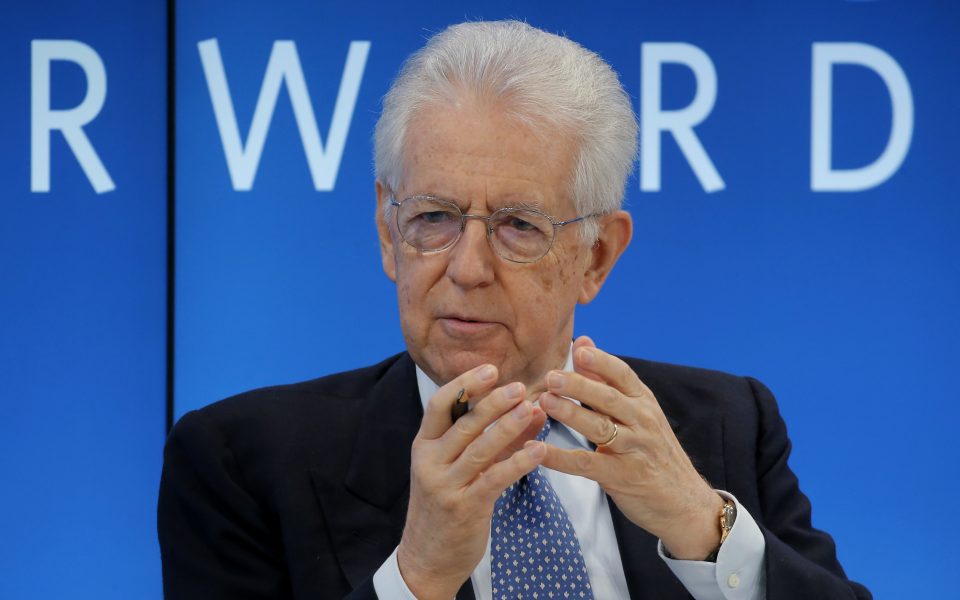The market cannot supply public goods efficiently

If there was something like an executive board of the European elite, Mario Monti would surely be a member. A senator for life and a former prime minister of Italy in the period 2011-13 (he took over after the high drama of the Cannes G20 Summit), earlier a commissioner for the internal market and competition and now president of the famed Bocconi University in Milan, he is a far cry from a radical.
Yet, speaking exclusively to Kathimerini on the occasion of the publication of a report by the Pan-European Commission on Health and Sustainable Development on the future of health governance, which he chairs, Monti is clear: Growing inequality is an issue that requires urgent attention. It threatens the prospects of European integration and makes societies more fragile in the face of crises like the Covid-19 pandemic.
The report, whose scientific coordinator is Elias Mossialos (whom Monti goes out of his way to praise), sketches out a comprehensive approach to ensure that the world is better prepared for the next pandemic. The former Italian leader tells us about its main proposals, how the European Union has mishandled Covid-19 and much besides.
‘Little done’ on inequality
The response to the 2020 crisis was very different to that of 2008-10. From bank bailouts and austerity, sparking populist anger, it can be argued that governments shifted to bailing out the people –pending massively to ensure that households and small businesses were able to survive the long spells of frozen economic activity. Could the pandemic lead to a rejuvenation of the welfare state? Will multinationals and high net worth individuals be made to pay their fair share in order to fund it and to service the new debts created by the crisis?
“It is an interesting comparison. There are so many differences between the two crises, including the fact that this time there is no question of it being linked to fiscally or financially irresponsible behavior. The absence of a guilty party explains why the EU in particular was much faster and more forthcoming in its economic and financial response, with Germany if anything at the forefront –xactly the opposite of what happened during the sovereign debt crisis.”
The evolution of the welfare state, and the question of inequality more widely, will be critical to the post-pandemic era, Monti says. “Until recently, little had been done, on the global level but also within the EU, to tackle the inequality of income and wealth. We have to take this issue much more seriously.”
The pandemic, he notes, exposed the extent of fragmentation in society, as its impact was felt very differently by various social and ethnic groups. Looking ahead to future health crises, he says “it is crucial to reduce the huge disparities in the fragility of different parts of society.”
But the issue is broader, he explains. “We are entering an era in which the connection between taxation and inequality becomes ever more evident.” Growing inequality “has become a source of potential and actual backlash against globalization and European integration. We cannot move forward with building structures of global governance without taking this into account.”
Monti argues that it is a priority to close down tax avoidance loopholes for multinationals, claiming that the political will to do this, in the EU and now in the US with the new Biden administration, has increased: “It is now more likely than ever before to have an agreement on a digital tax or something equivalent.” He is also keen to see the EU treat health and other investment spending differently than consumption spending by the public sector in the new fiscal rulebook that may emerge from the review in the second half of this year.
Vaccine dilemmas
The discussion turns to how the EU has handled the health crisis. European countries are heading for a second spring in confinement as the pace of vaccination has failed to contain the galloping mutant strains of the virus. The EU is threatening to block vaccine exports, as the US and Britain, which have received millions of doses from European factories, do not export to the EU. At the same time, vaccination in the poorest nations is proceeding at a glacial pace, as Western countries have cornered the market. I ask my interlocutor how concerned he is about the phenomenon of vaccine nationalism and how he views the response of the developed countries to the vaccination needs of the developing world.
“We are facing a dilemma, especially here in Europe, as we have not made enough progress with vaccinations in our countries, but at the same time we have a moral imperative and also an interest in making sure that the developing world can be vaccinated effectively,” Monti says. Noting that he has spent a good part of his professional life trying to make markets work efficiently and to prevent market failure, he argues, “It is clear that with regard to vaccines, given their special weight, we probably need to reconsider the relationship of power and control between public authorities and industry.”
On the vicissitudes of the EU vaccine rollout, he observes that “this dispute between the Commission, the European Medicines Agency and national governments [on the safety of the AstraZeneca vaccine] is a symptom of the transition we are in the midst of. The Commission and EMA have their role to play, but the final decisions are made by national governments, sometimes in a manner resembling a domino effect. We are indeed at war, as is often said, but we have not adapted the policy tools to a war situation. For example, the application of the precautionary principle in the AstraZeneca case, as it relates to the paramount interest of public health, needs to be looked at in a different way. It was curious how it was applied.”
Global monitoring
The report of the Pan-European Commission on Health and Sustainable Development makes the link between human, animal and planetary health explicit. Among other things, it proposes the creation of an Intergovernmental Panel on Health Threats, to improve monitoring and coordination on a global level and between different policy sectors.
“It would be something similar to the Intergovernmental Panel on Climate Change, which would monitor and try to prevent threats such as infectious diseases or microbial resistance through coordinated action by organizations related to health, agriculture and trade,” Monti says. Organizations like the Food and Agriculture Organization, the United Nations Environment Program, the World Organization for Animal Health and the World Health Organization “need to be more aligned,” he argues. “Their alignment can take various forms –ormal consultations at first, then in the long run perhaps participation in a common coordinating structure.”
“I also strongly believe that something similar to the Financial Stability Board, set up in the wake of the financial crisis, needs to be created at the G20 level for health,” he adds. “We are talking with the Italian presidency of the G20 about this. We think it would make sense to set up a Global Health Board, with experts and authorities from the health but also the economics and financial sector, which would be an engine for improving health policies and better coordinating them with policy in other areas. The best forum to do this effectively is probably the G20. So you see: We started with financial stability, we are now continuing with health – list of public goods is being created, to which we can add the environment and others which are increasingly important for the quality of human life. As public goods, however, the market does not supply them efficiently and they risk falling into a policy vacuum. So this Global Health Board, important in itself, could also be the forerunner of a broader Global Public Goods Board.”





